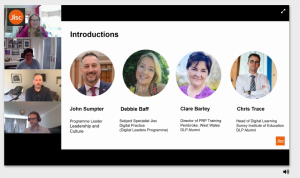Leading an Effective Digital Organisation Session at Connect More 4th May 2022
Leading an effective digital organisation is a complex and challenging journey that requires a passion for technology and inspiring people from across an organisation. How do you do that? How do you achieve your digital goals? How have others done it? These are just some of the questions we will ask and engage with others to highlight their journeys at Connect More.
Clare Barley (Director PRP Training) and Chris Trace (Head of Digital Learning Surrey Institute of Education), both Digital Leaders Programme (DLP) alumni, joined us at our online Connect More Session on “Leading an Effective Digital Organization.” Clare and Chris talked about their motivations for enrolling in the DLP as well as their experiences with the programme and their ongoing digital leadership adventures.

Audio Recording
Listen to an audio recording of the discussion via sound cloud
Questions and Answers
Q1 What VLE do you use Chris and how do you collate data from this? Thanks (Russell Wilson)
A2: (Chris’s Response) We use D2L Brightspace, have worked a lot to generate reports and the supplier can also give some information on which tools are used. I spend a lot of time in Excel pulling data together, my happy place 😉
Q2 Can I ask what features does MIRO have that the new updated Microsoft Whiteboard does not? We have access to Microsoft 365 so would obviously think about using this in the first instance. It certainly looks very similar. Thanks https://youtu.be/np9Tl-VcH3Q (Russell Wilson)
A2: (Chris’s Response) Hi Russell, from using both I’d say that there is certainly a lot of overlap. One of the key advantages I’d found in Miro is the ability to see where other users are, and to bring them to you so they see the same screen as you. As usual in MS products there is a workaround, which for Whiteboard is that you need to share your screen (NOT the whiteboard app within teams) and have the whiteboard app opened outside of teams. You can share it as a window if prefer not to share screen. This means you can show them what you want them to see. Also weirdly if you’re recording a Teams call and using the whiteboard app within Teams, it won’t record the whiteboard – so if you want it recorded you have to do it as above (open as a shared screen).
A2 (Clare’s response)unfortunately I have not used the updated whiteboard so am unable to compare. For us at present MIRO offers everything we need and fits so well with our organisation we would be unlikely to look elsewhere at present
Q3 for Chris – continuing the theme from today’s opening keynote, are you partnering with your library service at Surrey to create a digital culture, if so how? (Elisabeth Parcell)
A3: (Chris’s Response) Hi Elisabeth, a good question and unfortunately the answer for me currently is ‘not as much as I’d like to’. We certainly have a lot of overlap at Surrey; we both upskill students in different aspects of their studies (we work on digital skills, they work on study skills so plenty of overlap). Our neurodiversity team sit within the library and work with students, and we have a recent appointment of a digital accessibility officer who works in their team, but with us too. Would like to work more comprehensively together on use of some of the library’s digital tools, for example Bibliu, traditionally they have ‘owned’ this. In future would like more of a ‘one-stop-shop’ for students so they don’t need to know which team to go to, so watch this space!
Q4 Is leadership just meeting the demands of staff or should there be a more proactive drive to leadership? What direction should leaders be taking educational providers in an increasingly digital world? (Simon Clarke)
A3: (Chris’s Response)Hi Simon, apologies we didn’t have this question come up for us in our Q&A tool during the session, as it’s a great one and gets to the heart of what we were starting to talk about in terms of the role of ‘digital’ leadership in education. I would start in answering your question by saying that I do think meeting demands of staff is one part of being a leader (or perhaps a manager). As Head of Digital Learning, I see my role as both being a manager (keeping things running smoothly, getting staff to work in their best way and deliver the best outputs which often involves listening and responding to their demands/needs/wants) but also as a leader. As a leader I think it is our duty to be forward-looking and proactive as well; we need to be able to paint the vision, but also sell the vision to those around us and beyond. This requires people skills and an intimate knowledge of what their demands are, and where they’re coming from. If you as a leader don’t understand where staff under, around and above you are coming from, then your vision is likely to be wrong or not in the best interests of the organisation. You need to create the balance between the needs of the Team, Task and Individual in order to bring the community along. Universities do seem to often run on goodwill, it greases the cogs, so being conscious of this whilst also still managing expectations is part of the juggling act.
A3: (Clare’s response) I don’t believe leadership is just meeting the demands of staff, whilst listening and responding to staff is a critical part of leadership, what is more important is being open to feedback and organisational movement from all communication channels. This may be through networking, marketing, increasing your personal skills, Stakeholders, customers or national change. Leadership must be influenced by all the working parts of the business around it to ensure the organisation continues to improve, develop and withstand change. In terms of direction within education within a digital age, I feel it would be too easy to continue the steep incline of digital development implemented in the last two years as our working and learning environment has changed again. Whilst we seek to be efficient and effective within a digital platform this does not mean we have to be blinkered to understanding the need of each cog within the clock. To benefit from the massive jump in digital learning in the most effective way we need to ensure our leadership is open and that we play a keen role as active listeners to take the best of what the last two years have taught us whilst remembering pedagogy lessons of the decades prior.
Digital Leadership
If you would like to share your digital leadership journey with us please do get in touch deborah.baff@jisc.ac.uk

